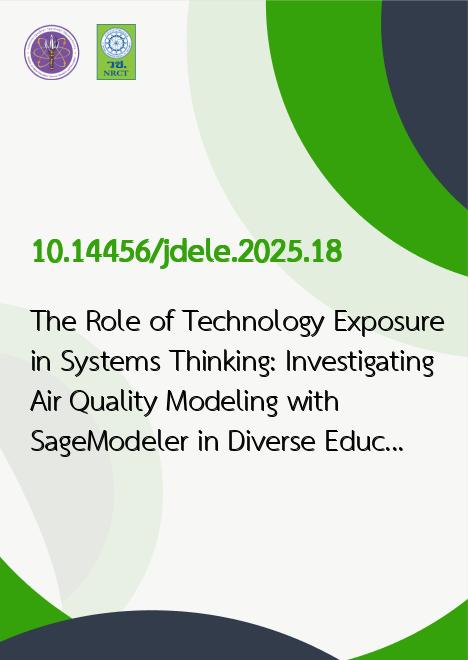
|
The Role of Technology Exposure in Systems Thinking: Investigating Air Quality Modeling with SageModeler in Diverse Educational Contexts |
|---|---|
| รหัสดีโอไอ | |
| Creator | Thanyaluck Ingkavara |
| Title | The Role of Technology Exposure in Systems Thinking: Investigating Air Quality Modeling with SageModeler in Diverse Educational Contexts |
| Contributor | Parinya Chomnok, Thanyaluck Ingkavara, Artorn Nokkaew, Suparat Chuechote |
| Publisher | Digital Education and Learning Engineering Association |
| Publication Year | 2568 |
| Journal Title | Journal of Digital Education and Learning Engineering |
| Journal Vol. | 1 |
| Journal No. | 2 |
| Page no. | 97-104 |
| Keyword | Air quality modeling, dynamics modeling tool, SageModeler, STEM education, systems thinking |
| URL Website | https://so18.tci-thaijo.org/index.php/delethailand |
| Website title | Journal of Digital Education and Learning Engineering Association |
| ISSN | 3088-1552 |
| Abstract | This study explores the impact of students’ prior exposure to technology on their ability to model air quality phenomena using SageModeler, a web-based, open-ended, systems modeling tool designed to facilitate conceptual understanding through dynamic simulations and visual representations of causal relationships. Students used the tool to engage in core modeling practices such as defining system boundaries, establishing causal links, using evidence to build and revise models, and interpreting outcomes to make predictions and explanations. A comparative study was conducted between an urban school, well-equipped with digital resources and where students were familiar with web-based tools, and a rural school with limited computer access and minimal prior exposure to digital modeling. Urban students, who had prior experience with technology-based learning, demonstrated greater ease in integrating multiple variables, refining model relationships, and iteratively improving their models based on simulated feedback. In contrast, rural students initially faced challenges navigating the digital tool but exhibited notable improvements in systems thinking when provided with structured guidance and scaffolding. Findings suggest that while technology enhances modeling practices, exposure and instructional support are key factors in fostering systems thinking across diverse educational contexts. |